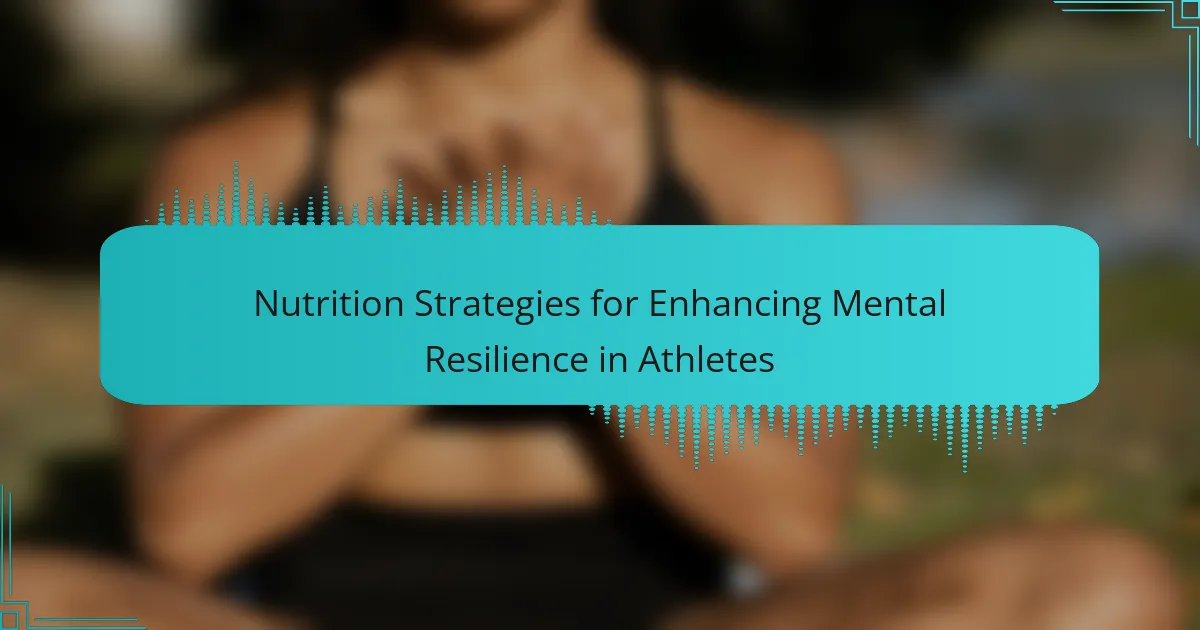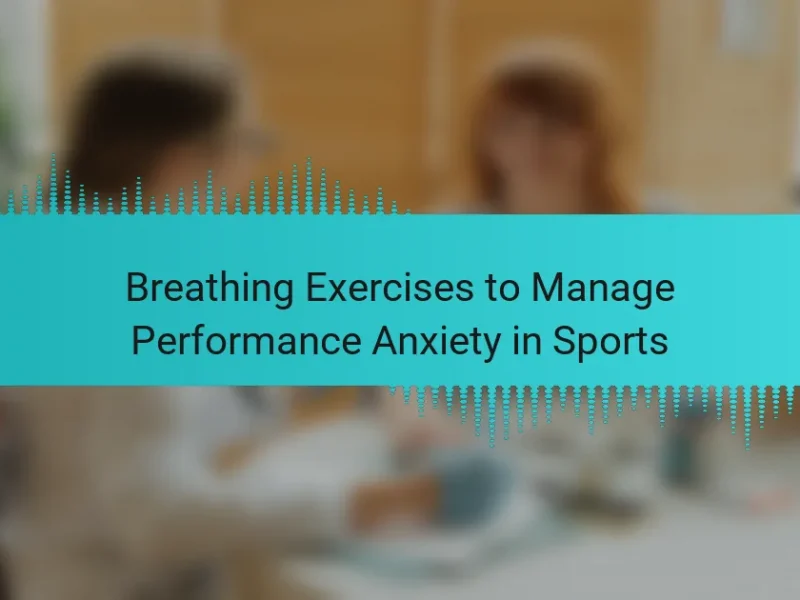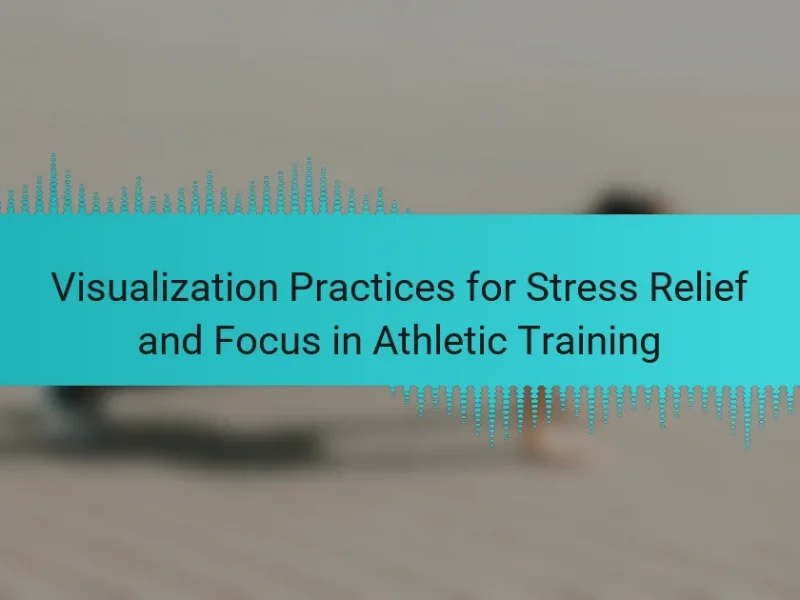Enhancing mental resilience in athletes is crucial for optimal performance and stress management. Key nutrition strategies include balanced intake of complex carbohydrates, omega-3 fatty acids, and antioxidants. Proper hydration and meal timing further support cognitive function and mood stability. Recognising common dietary mistakes can help athletes improve their mental clarity and recovery.
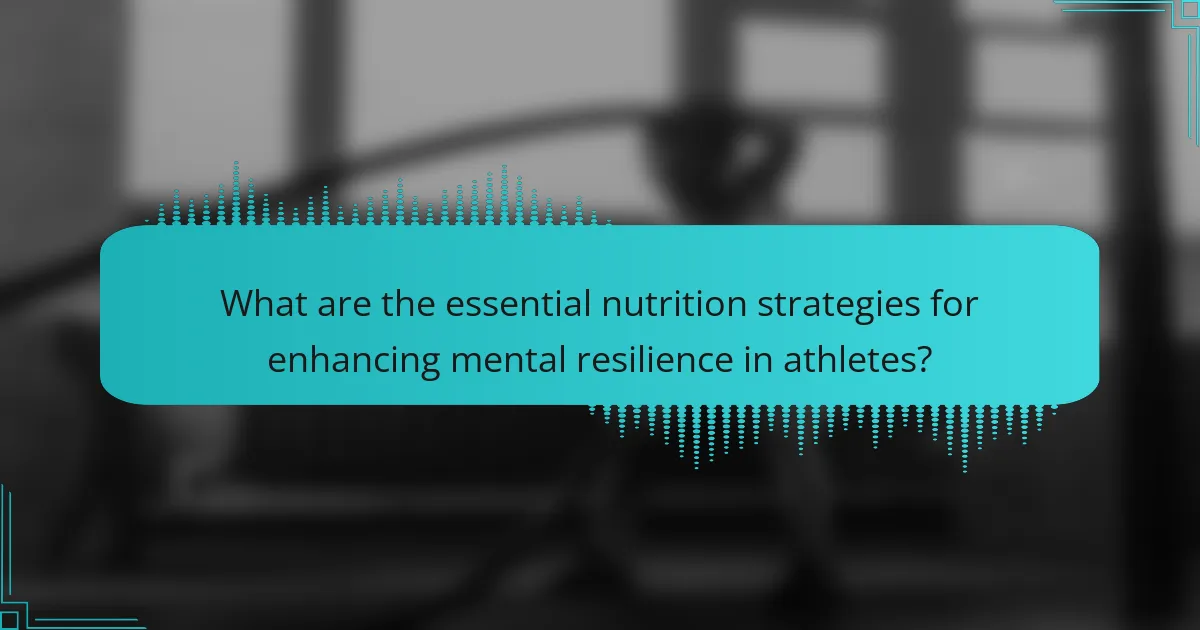
What are the essential nutrition strategies for enhancing mental resilience in athletes?
Nutrition strategies for enhancing mental resilience in athletes focus on balanced intake, hydration, and nutrient timing. Consuming complex carbohydrates supports sustained energy levels, while adequate protein intake aids in recovery and cognitive function. Omega-3 fatty acids, found in fish, promote brain health and reduce stress. Hydration is crucial, as dehydration negatively impacts mood and concentration. Incorporating antioxidants from fruits and vegetables helps combat oxidative stress, enhancing overall mental clarity. Regular meals and snacks maintain stable blood sugar levels, supporting consistent performance and mental focus.
How do macronutrients impact mental performance?
Macronutrients significantly influence mental performance by providing the energy and nutrients necessary for optimal brain function. Carbohydrates enhance glucose availability, crucial for cognitive tasks. Proteins supply amino acids, which are essential for neurotransmitter synthesis, impacting mood and focus. Fats, particularly omega-3 fatty acids, support brain structure and function, promoting cognitive resilience. Balancing these macronutrients is vital for athletes aiming to improve mental resilience and overall performance.
What role do micronutrients play in cognitive function?
Micronutrients significantly enhance cognitive function by supporting brain health and mental resilience in athletes. Essential vitamins and minerals like B vitamins, omega-3 fatty acids, and antioxidants contribute to improved memory, focus, and overall cognitive performance. For example, B vitamins play a crucial role in energy metabolism, while omega-3 fatty acids are vital for neuronal structure and function. A deficiency in these micronutrients can lead to cognitive decline and decreased mental agility, impacting athletic performance. Thus, a balanced diet rich in micronutrients is essential for optimising cognitive function and mental resilience in athletes.
Which vitamins and minerals are crucial for mental resilience?
Vitamins B, D, and minerals like magnesium and zinc are crucial for mental resilience. These nutrients support cognitive function, reduce stress, and enhance mood stability.
Vitamin B complex, particularly B6, B9, and B12, plays a significant role in neurotransmitter synthesis, which is essential for emotional regulation. Vitamin D is linked to mood improvement and cognitive health, while magnesium helps manage stress levels and anxiety. Zinc contributes to neurotransmission and may improve mood and cognitive performance.
Incorporating these vitamins and minerals through a balanced diet can enhance mental resilience, particularly in athletes who face high levels of stress and performance pressure.
How can hydration levels affect mental clarity and focus?
Hydration levels significantly impact mental clarity and focus. Adequate hydration enhances cognitive function, improves concentration, and reduces fatigue. Studies show that even mild dehydration can impair attention and short-term memory, affecting overall performance in athletes. Maintaining optimal fluid intake supports mental resilience, allowing athletes to perform at their best.
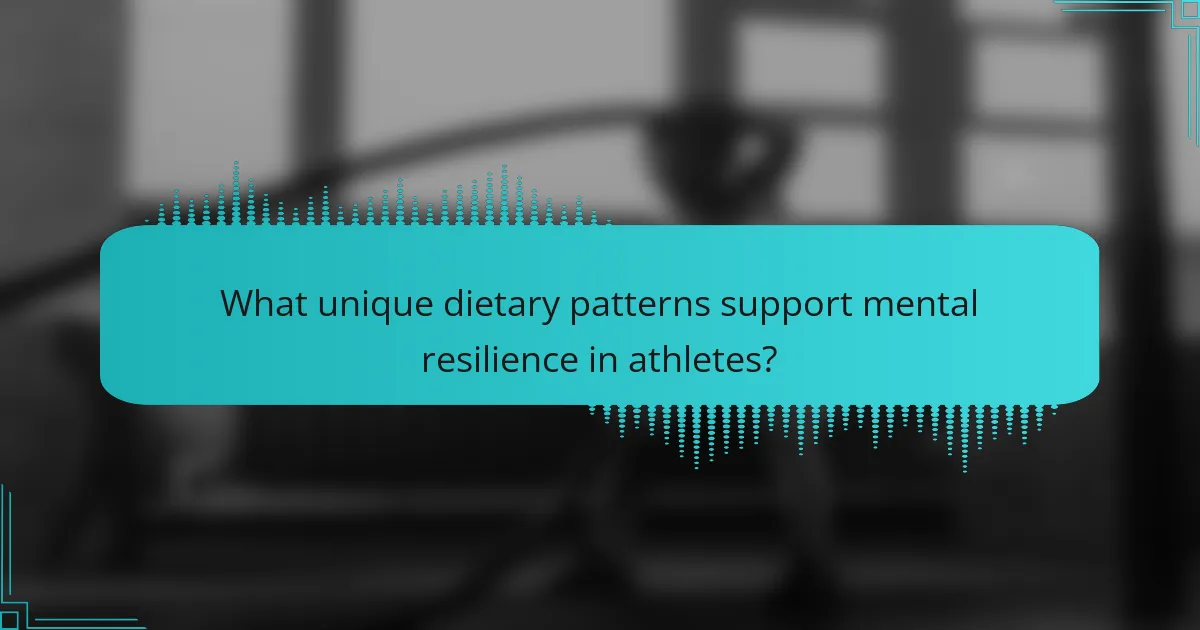
What unique dietary patterns support mental resilience in athletes?
Unique dietary patterns that support mental resilience in athletes include a balanced intake of omega-3 fatty acids, antioxidants, and whole grains. These nutrients enhance cognitive function and reduce stress. For example, foods like fatty fish, berries, and quinoa are beneficial. Research indicates that a diet rich in these elements can improve mood and focus, essential for peak performance. Additionally, hydration plays a critical role in maintaining mental clarity and resilience during training and competition.
How does the Mediterranean diet contribute to cognitive health?
The Mediterranean diet enhances cognitive health through its rich nutrient profile. It emphasises fruits, vegetables, whole grains, and healthy fats, which support brain function. Research indicates that this diet may reduce the risk of cognitive decline by up to 40%. Key components like omega-3 fatty acids and antioxidants contribute to improved memory and mood stability. Additionally, the diet fosters social interactions during meals, promoting mental well-being.
What benefits does a plant-based diet offer for mental resilience?
A plant-based diet enhances mental resilience by providing essential nutrients that support brain health. Key benefits include improved mood, reduced anxiety, and enhanced cognitive function.
This diet is rich in antioxidants, vitamins, and minerals, which combat oxidative stress and inflammation. For instance, omega-3 fatty acids from flaxseeds and walnuts benefit brain function.
Research shows that individuals consuming a plant-based diet report lower levels of depression and anxiety, contributing to better mental health outcomes.
Additionally, whole foods like fruits, vegetables, and legumes offer a steady supply of energy, which is crucial for maintaining focus and mental clarity during athletic performance.
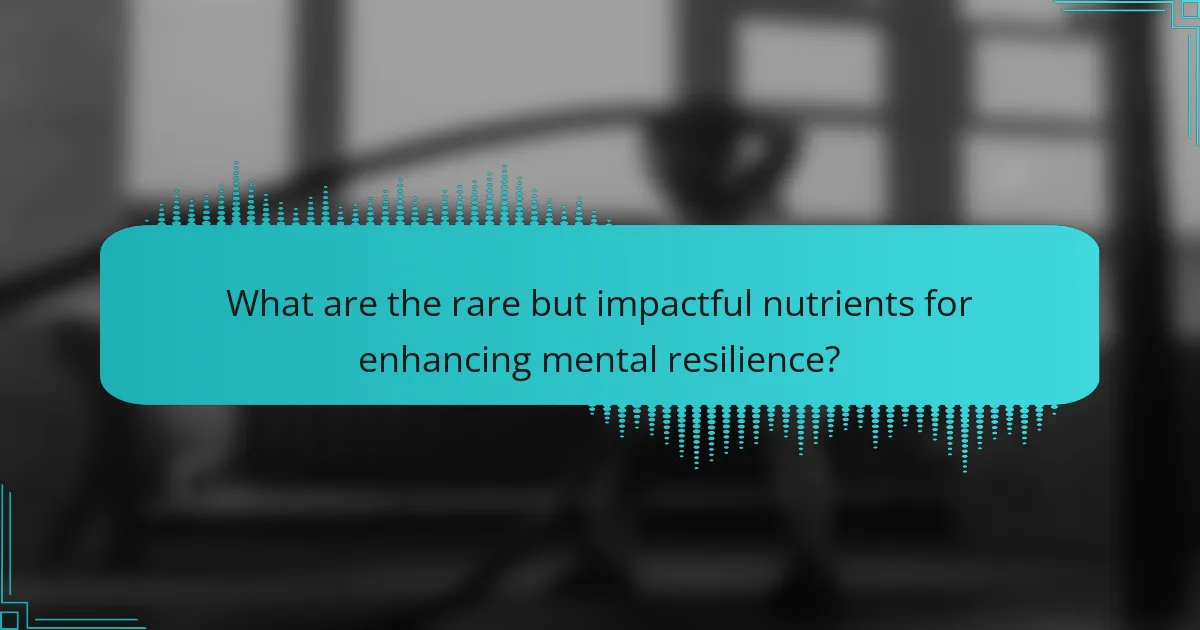
What are the rare but impactful nutrients for enhancing mental resilience?
Rare nutrients that enhance mental resilience include omega-3 fatty acids, magnesium, and B vitamins. Omega-3s improve cognitive function and mood stability. Magnesium supports stress management and reduces anxiety. B vitamins, particularly B6, B9, and B12, are crucial for neurotransmitter synthesis and overall brain health. These nutrients, although not commonly highlighted, significantly contribute to mental resilience in athletes.
How do adaptogens influence mental stress responses?
Adaptogens enhance mental resilience by modulating stress responses. They help regulate cortisol levels, which can reduce anxiety and improve focus. Research indicates that adaptogens like ashwagandha and rhodiola rosea contribute to better cognitive performance under stress. Athletes incorporating these adaptogens may experience improved mental clarity and reduced fatigue during high-pressure situations.
What specific adaptogens are beneficial for athletes?
Rhodiola rosea, Ashwagandha, and Ginseng are beneficial adaptogens for athletes. Rhodiola rosea enhances endurance and reduces fatigue. Ashwagandha improves stress resilience and recovery times. Ginseng boosts energy levels and cognitive function. These adaptogens support mental resilience, essential for athletic performance.
What is the significance of omega-3 fatty acids in brain health?
Omega-3 fatty acids are crucial for brain health as they support cognitive function and emotional well-being. They enhance neuronal communication and reduce inflammation, which can improve mood and mental clarity. Research shows that athletes with higher omega-3 levels experience better mental resilience and focus during training and competition. Additionally, these fatty acids may lower the risk of cognitive decline, making them essential for long-term brain health.
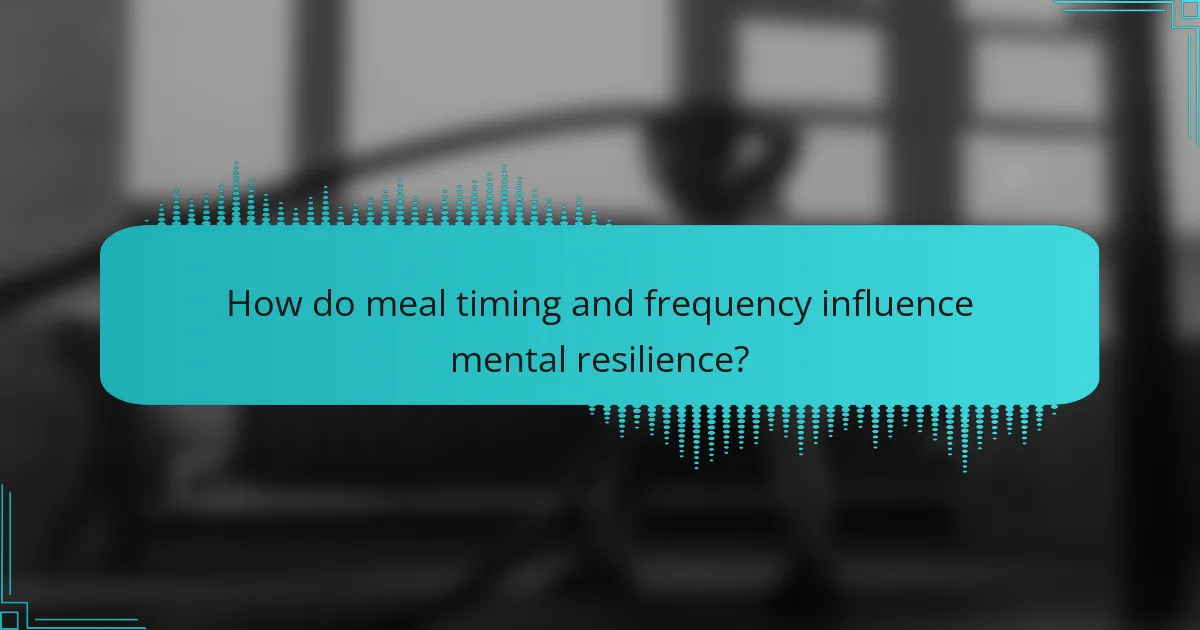
How do meal timing and frequency influence mental resilience?
Meal timing and frequency significantly influence mental resilience by optimising energy levels and cognitive function. Consistent meal patterns stabilise blood sugar, enhancing focus and mood. Research indicates that athletes who consume balanced meals regularly report improved mental clarity and reduced stress. Additionally, strategic timing of nutrients, such as carbohydrates and proteins, can boost recovery and mental performance, reinforcing resilience under pressure.
What is the best meal timing strategy for athletes?
The best meal timing strategy for athletes involves consuming meals and snacks at specific intervals to optimise performance and recovery. Athletes should aim to eat a balanced meal 3-4 hours before training or competition to fuel their bodies.
Post-exercise nutrition is crucial; consuming protein and carbohydrates within 30 minutes aids recovery. This timing enhances muscle repair and replenishes glycogen stores. Additionally, small snacks can be beneficial 30-60 minutes before workouts to provide quick energy.
Hydration should also be considered in meal timing strategies, as proper fluid intake supports overall performance. Athletes should drink water consistently throughout the day, especially before and after meals.
Individual needs may vary, so athletes should experiment with timing to find what works best for their performance and recovery.
How does intermittent fasting affect cognitive performance?
Intermittent fasting can enhance cognitive performance by improving focus and mental clarity. Studies indicate that fasting promotes neurogenesis and reduces oxidative stress, leading to better brain function. Additionally, it may increase levels of brain-derived neurotrophic factor (BDNF), which supports learning and memory. As a result, athletes incorporating intermittent fasting may experience improved mental resilience during training and competition.
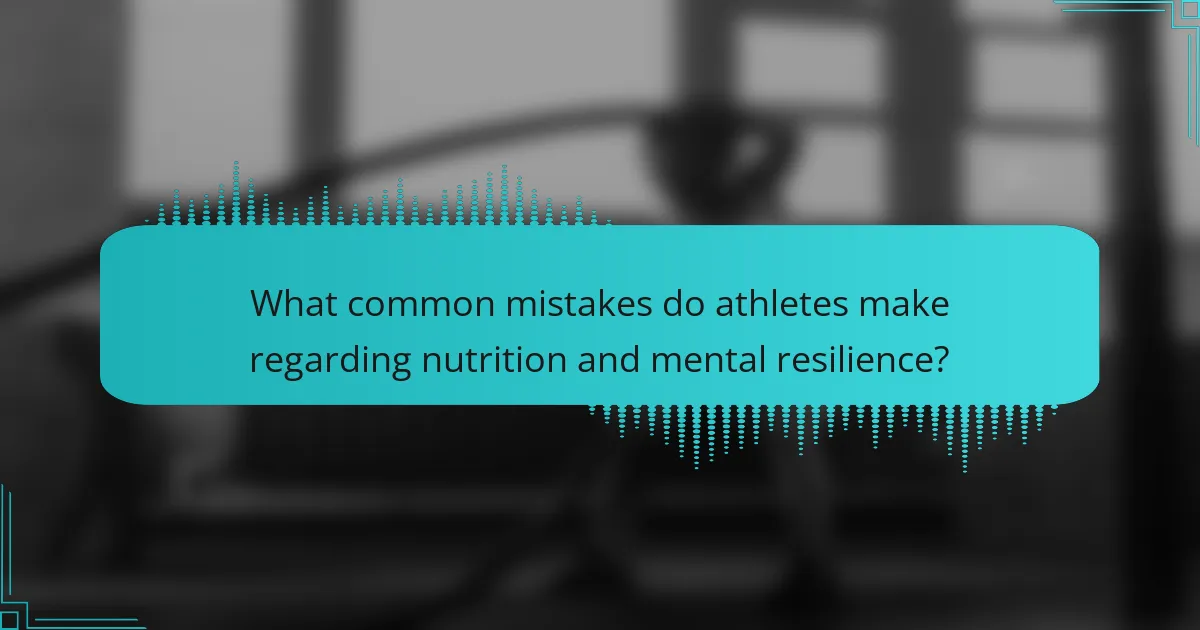
What common mistakes do athletes make regarding nutrition and mental resilience?
Athletes often make several common mistakes regarding nutrition and mental resilience. They frequently neglect hydration, which can impair cognitive function and performance. Many athletes also focus too heavily on macronutrient ratios, overlooking the importance of micronutrients for mental health. Additionally, they may skip meals or rely on processed foods, leading to energy crashes and decreased focus. Lastly, athletes often underestimate the role of nutrition in recovery, which is vital for maintaining mental resilience during training and competition.
How can athletes avoid nutritional deficiencies?
Athletes can avoid nutritional deficiencies by following a balanced diet rich in essential nutrients. Prioritise whole foods, including fruits, vegetables, lean proteins, and whole grains.
Incorporate nutrient-dense snacks to maintain energy levels and support recovery. Hydration is crucial; drink adequate fluids before, during, and after training. Regularly consult a sports nutritionist for personalised guidance.
Monitor micronutrient intake, focusing on vitamins and minerals critical for performance, like iron and calcium. Adjust dietary plans based on training intensity and individual needs to ensure optimal nutrition.
What are the pitfalls of relying on supplements for mental health?
Relying solely on supplements for mental health can lead to several pitfalls. These include potential nutrient imbalances, reliance on unproven products, and neglecting holistic approaches. Supplements may not address underlying issues or provide the necessary nutrients in effective forms. Additionally, overuse can lead to adverse effects, diminishing returns, or interactions with medications. Athletes should prioritise a balanced diet and consult professionals for tailored nutrition strategies.
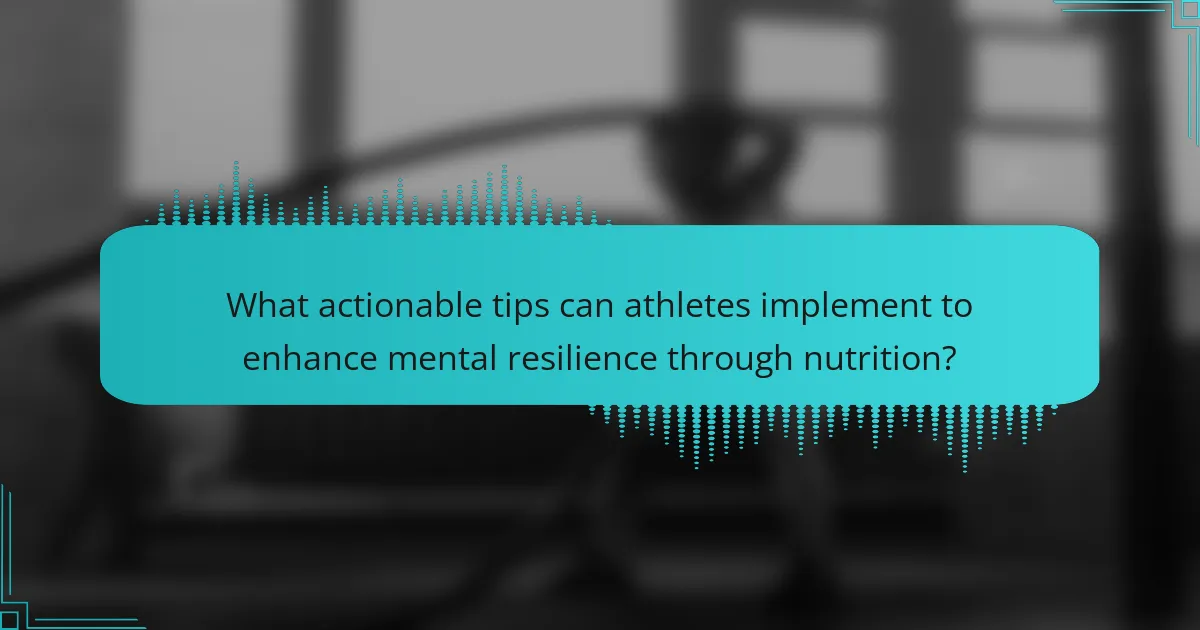
What actionable tips can athletes implement to enhance mental resilience through nutrition?
Athletes can enhance mental resilience through targeted nutrition strategies. Incorporating complex carbohydrates, such as whole grains, helps maintain stable energy levels, supporting focus during training and competition. Omega-3 fatty acids, found in fish and flaxseeds, are linked to improved mood and cognitive function, crucial for mental strength. Hydration is vital; even mild dehydration can impair cognitive performance. Consuming antioxidant-rich foods, like berries and leafy greens, can reduce oxidative stress, promoting better recovery and mental clarity. Regular meal timing and balanced macronutrients optimise brain function and emotional stability, fostering resilience in high-pressure situations.
How can athletes create a balanced meal plan for optimal brain function?
Athletes can create a balanced meal plan for optimal brain function by including a variety of nutrient-dense foods. Focus on incorporating complex carbohydrates, healthy fats, and lean proteins.
1. Prioritise whole grains like quinoa and brown rice for sustained energy.
2. Include omega-3 fatty acids from sources like salmon and walnuts to support cognitive health.
3. Add colourful fruits and vegetables for antioxidants that combat oxidative stress.
4. Stay hydrated with water and electrolyte-rich beverages to maintain concentration.
These strategies enhance mental resilience, improving focus and decision-making during performance.
What are practical ways to incorporate brain-boosting foods into daily meals?
Incorporating brain-boosting foods into daily meals enhances mental resilience in athletes. Start by adding blueberries to breakfast cereals or smoothies for their antioxidant properties. Include fatty fish like salmon in lunch for omega-3 fatty acids that support cognitive function. Snack on nuts, particularly walnuts, which are known for their unique brain-healthy nutrients. Lastly, use dark chocolate in desserts to provide a rare source of flavonoids that improve brain health.
